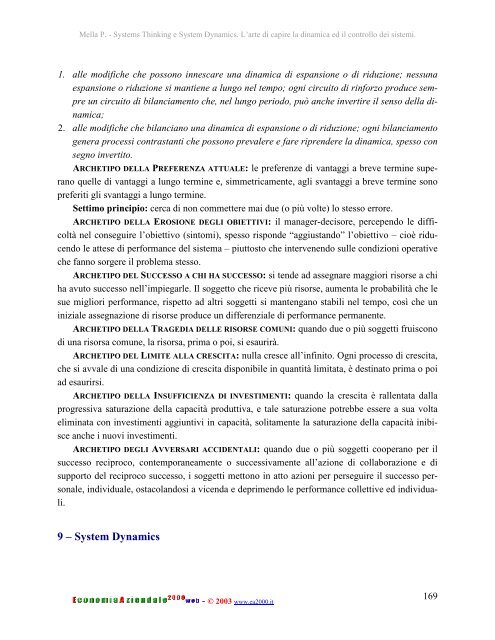Systems Thinking e System Dynamics. L'arte di capire la dinamica ...
Systems Thinking e System Dynamics. L'arte di capire la dinamica ...
Systems Thinking e System Dynamics. L'arte di capire la dinamica ...
- No tags were found...
Create successful ePaper yourself
Turn your PDF publications into a flip-book with our unique Google optimized e-Paper software.
Mel<strong>la</strong> P. - <strong><strong>System</strong>s</strong> <strong>Thinking</strong> e <strong>System</strong> <strong>Dynamics</strong>. L’arte <strong>di</strong> <strong>capire</strong> <strong>la</strong> <strong>di</strong>namica ed il controllo dei sistemi.1. alle mo<strong>di</strong>fiche che possono innescare una <strong>di</strong>namica <strong>di</strong> espansione o <strong>di</strong> riduzione; nessunaespansione o riduzione si mantiene a lungo nel tempo; ogni circuito <strong>di</strong> rinforzo produce sempreun circuito <strong>di</strong> bi<strong>la</strong>nciamento che, nel lungo periodo, può anche invertire il senso del<strong>la</strong> <strong>di</strong>namica;2. alle mo<strong>di</strong>fiche che bi<strong>la</strong>nciano una <strong>di</strong>namica <strong>di</strong> espansione o <strong>di</strong> riduzione; ogni bi<strong>la</strong>nciamentogenera processi contrastanti che possono prevalere e fare riprendere <strong>la</strong> <strong>di</strong>namica, spesso consegno invertito.ARCHETIPO DELLA PREFERENZA ATTUALE: le preferenze <strong>di</strong> vantaggi a breve termine superanoquelle <strong>di</strong> vantaggi a lungo termine e, simmetricamente, agli svantaggi a breve termine sonopreferiti gli svantaggi a lungo termine.Settimo principio: cerca <strong>di</strong> non commettere mai due (o più volte) lo stesso errore.ARCHETIPO DELLA EROSIONE DEGLI OBIETTIVI: il manager-decisore, percependo le <strong>di</strong>fficoltànel conseguire l’obiettivo (sintomi), spesso risponde “aggiustando” l’obiettivo – cioè riducendole attese <strong>di</strong> performance del sistema – piuttosto che intervenendo sulle con<strong>di</strong>zioni operativeche fanno sorgere il problema stesso.ARCHETIPO DEL SUCCESSO A CHI HA SUCCESSO: si tende ad assegnare maggiori risorse a chiha avuto successo nell’impiegarle. Il soggetto che riceve più risorse, aumenta le probabilità che lesue migliori performance, rispetto ad altri soggetti si mantengano stabili nel tempo, così che uniniziale assegnazione <strong>di</strong> risorse produce un <strong>di</strong>fferenziale <strong>di</strong> performance permanente.ARCHETIPO DELLA TRAGEDIA DELLE RISORSE COMUNI: quando due o più soggetti fruiscono<strong>di</strong> una risorsa comune, <strong>la</strong> risorsa, prima o poi, si esaurirà.ARCHETIPO DEL LIMITE ALLA CRESCITA: nul<strong>la</strong> cresce all’infinito. Ogni processo <strong>di</strong> crescita,che si avvale <strong>di</strong> una con<strong>di</strong>zione <strong>di</strong> crescita <strong>di</strong>sponibile in quantità limitata, è destinato prima o poiad esaurirsi.ARCHETIPO DELLA INSUFFICIENZA DI INVESTIMENTI: quando <strong>la</strong> crescita è rallentata dal<strong>la</strong>progressiva saturazione del<strong>la</strong> capacità produttiva, e tale saturazione potrebbe essere a sua voltaeliminata con investimenti aggiuntivi in capacità, solitamente <strong>la</strong> saturazione del<strong>la</strong> capacità inibisceanche i nuovi investimenti.ARCHETIPO DEGLI AVVERSARI ACCIDENTALI: quando due o più soggetti cooperano per ilsuccesso reciproco, contemporaneamente o successivamente all’azione <strong>di</strong> col<strong>la</strong>borazione e <strong>di</strong>supporto del reciproco successo, i soggetti mettono in atto azioni per perseguire il successo personale,in<strong>di</strong>viduale, ostaco<strong>la</strong>ndosi a vicenda e deprimendo le performance collettive ed in<strong>di</strong>viduali.9 – <strong>System</strong> <strong>Dynamics</strong>- © 2003 www.ea2000.it169
















